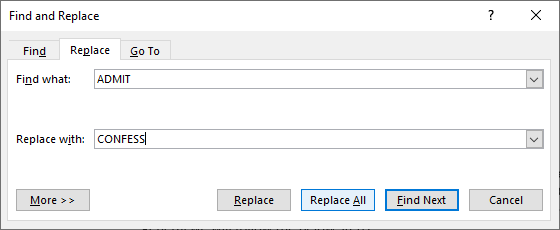
Business automation – RPA
Robotic Process Automation (RPA) is an emerging technology practice used by different businesses, be it small, medium or large, who want to increase service quality or reduce costs but without any change in their existing processes
What is RPA?
Just like Machine Learning (ML) and Artificial Intelligence (AI), RPA (Robotic Process Automation) is another form of technology for automating business processes that previously required humans to perform.
Where is RPA used?
RPA works on existing Graphical User Interface (GUI) applications to perform a particular task just like a normal user will do. For e.g. suppose in a folder there are 10,000+ word files. Now the task is, in each of the word file we need to find the word ADMIT and replace it with CONFESS. In general we will follow the below steps.

- Open Microsoft Word.
- Go to File → Open.
- Select the word file
- Now click on the Replace menu.
- Enter the text in find and replace boxes provided as show in the image below and click on Replace All button.
- Save and Close the file.
- Now repeat the Step b to Step f for each word file.
You can see how much manual time it will take to do the above steps for 10,000 files. It is quite possible we might miss out some files if we do it manually. Now using RPA a software robot can do the above mentioned tasks quickly and accurately.
What are the benefits of using RPA?
- We can avoid human errors and reduce human efforts.
- We can save time, improve productivity, consistency and accuracy.
- It will help us in reducing cost.
- Enhance the business analytics and easy standardization of workflow.
- To have a frictionless delivery of tasks.
Do we require any coding skills for RPA?
No programming skills is required. People who are Subject Matter Experts (SME’s), Graphic Designers (GD’s), Testers etc. having no programming knowledge can be trained to automate processes using RPA tools within a few weeks
Best Practices of RPA Implementation
- We should consider the impact on the business before we start.
- Workout the desired ROI.
- Poor design, change management can wreak havoc
- Governance of the project is foremost thing in RPA process. Policy, Corporate, Government compliance should be ensured.
General Usage of RPA
- Emulates the repetitive process done by the human in various systems.
- It can perform tasks like data entry, data extraction copying, and pasting.
- It can execute multiple and complex tasks across systems.
- It can be beneficial to QA processes which cover regression testing and automating customer use case scenarios.
- Allows automated data migration through systems which is not possible using traditional mediums, like document, spreadsheets or other source data files.
What are the different types of RPA tools available in the market?
Can we use selenium for RPA?
RPA and Selenium influence each other in the end product or service achieved. Both are on and off-screen performers and an inevitable part of the computerization revolution wave across the globe. We can also say that customized RPA can be achieved via selenium.
Share this post

Sriram
(Project Manager )
Sriram is an e-learning expert with almost two decades of experience spanning across India’s leading e-learning companies. At Mind IT Systems, Sriram works as a Project Management Specialist and helps in building organizational culture. His hobbies include traveling, stamps, and coins collection and he can talk for hours about stock market investments.

